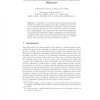Free Online Productivity Tools
i2Speak
i2Symbol
i2OCR
iTex2Img
iWeb2Print
iWeb2Shot
i2Type
iPdf2Split
iPdf2Merge
i2Bopomofo
i2Arabic
i2Style
i2Image
i2PDF
iLatex2Rtf
Sci2ools
SAB
2010
Springer
2010
Springer
Attentional Modulation of Mutually Dependent Behaviors
In this paper, we investigate simple attentional mechanisms suitable for sensing rate regulation and action coordination in the presence of mutually dependent behaviors. We present our architecture along with a case study where a real robotic system is to manage and harmonize conflicting tasks. This research focuses on attentional mechanisms for regulating the frequencies of sensor readings and action activations in a behavior-based robotic system. Such mechanisms are to direct sensors toward the most salient sources of information and filter the available sensory data to prevent unnecessary information processing.
Attentional Mechanisms | Available Sensory Data | Optimization | SAB 2010 | Simple Attentional Mechanisms |
Related Content
| Added | 30 Jan 2011 |
| Updated | 30 Jan 2011 |
| Type | Journal |
| Year | 2010 |
| Where | SAB |
| Authors | Ernesto Burattini, Silvia Rossi, Alberto Finzi, Mariacarla Staffa |
Comments (0)

